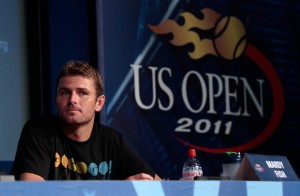So there was Mardy Fish a couple days ago, sitting for a press conference and sounding thrilled, excited, maybe a bit overwhelmed — you know, all that stuff you feel when you’re now the No. 1 American player.
It’s taken him about 13 years to reach this pinnacle when, frankly, he could have been there a decade ago, and had he been, he and Roddick would have been one of the great one-two punches of U.S. tennis.

When Fish, who is now 29, was one of the Boca Five training with Andy Roddick and three other juniors on some apartment house hardcourt six days a week in South Florida, it was Mardy, not Andy, who had the most talent.
Mardy was supposed to be first up the mountain, just ahead of Roddick. He had almost everything one needed for a successful pro career — big serve, physical size, tennis smarts imparted by his teaching pro father, Tom Fish, and, best of all, the fundamentals of a world-class backhand.
What he didn’t have was Roddick’s unflinching determination to be great and willingness to do anything to be an elite player and, when Roddick reached No. 1 in the world for nine weeks in March of 2003, Mardy was only No. 51.
He would get better, cracking top-20 later that year, and then his ranking would dip and rise over and over along with his weight, his physical conditioning and his succession of injuries.
It was only in the last few years that Fish developed the sort of single-mindedness that shot Roddick into the top-10 for 10 years, and he might have achieved his current No. 8 status even earlier had he not still had to battle through injuries.
Today, however, he looks pristine. Married. Happy. Relaxed. Weight is perfect. He’s much faster on court. He has the endurance he once lacked that allows him to grind points. He still has the playful sense of humor that allowed him to easily bond with Roddick when they were housemates and high school buds. But, though it has taken him long enough, he’s now got the commitment to tennis that Roddick was never able to imprint on the young Mardy Fish.
Mardy arrived in New York having won the U.S. Open Series, which means if he wins the U.S. Open, he earns a $1 million bonus to go with the $1.8 million prize money. He is certainly not the footnote he has been in past U.S. Opens. He’s now a focal point.
“It’s been a different preparation for me (at this Open) in the sense that I’ve had a bunch more media things that I’ve done and sponsor things I’ve done,” he said. “Those are the benefits of being in the position that I’m in. That side of it has been very exciting and I choose to think about the exciting part instead of the nervous part.”
Fish nervous? He says he is on the morning of matches, yet he always seems more antic than shaky. He was perhaps the biggest joker among those five juniors training in Boca Raton, Fl. But, though he never drove himself as hard as Roddick once they turned pro, he was also a combative opponent on court.
Just as Jim Courier and Andre Agassi drove each other in competition in the more glamorous junior ambiance of the Bollettieri Academy, Fish and Roddick, and the other three — Bo Hodge, David and Chris Martin — drove each other in practices as well.
There were some tense moments in those down and dirty practice matches, and perhaps none came closer to punches than the Fish-Roddick practice session on a grass court at Roehampton, England, just before the Wimbledon juniors.
“We beat each other up every day on the court and Mardy and I were the most likely to freak on each other,” says Roddick. “We’d end up yelling and screaming and almost getting into fist fights, but it only made us better.
“We were playing a practice set (at Roehampton) and Mardy was playing unreal, and he liked to let you knew he was playing unreal. We had an argument and wound up on the same side of the net in each other’s face. It was almost like a sibling rivalry,” said Roddick. “We’d have a fight and then we’d be laughing and joking about it.”
Where Mardy had to learn commitment, he never lost his competitive zeal, and he is now 37-17 after sweeping easily past Tomas Kamke of Germany in the first round of the Open. He next catches qualifier Malek Jaziri of Tunisia with, probably, tall, spindly Kevin Anderson waiting in the third and, if successful, a likely round-of-16 match with Jo-Wilfried Tsonga.
Mardy has had an excellent year, especially since Wimbledon, but much of what he’s accomplished will be dismissed if he doesn’t do well in New York. Winning an ATP 1000 is important, but, ultimately, you’re judged by your performances in the Slams.
After a second round exit at the Australian Open (Tommy Robredo) and a third round loss at the French (Gilles Simon), Fish upset Tomas Berdych at Wimbledon before going out in four to Rafa Nadal in the quarters.
He’s played at his highest level ever since and he looked awfully strong on Day 1 of the Open. Can he win this Slam? It’s unlikely, though that’s an improvement on past years when he wouldn’t even be considered.
Mardy Fish might have been the U.S. No. 1 years ago if life had unfolded differently for him. It didn’t, but that’s fine. He’s No. 1 now and he’ll make the best of it with the time he has. You wish he was 24 again and who knows how many prime years he has left with his history of knee and wrist problems.
One thing, however, we do know for sure. He’s finally totally committed, and that’s why he’s America’s No. 1.
